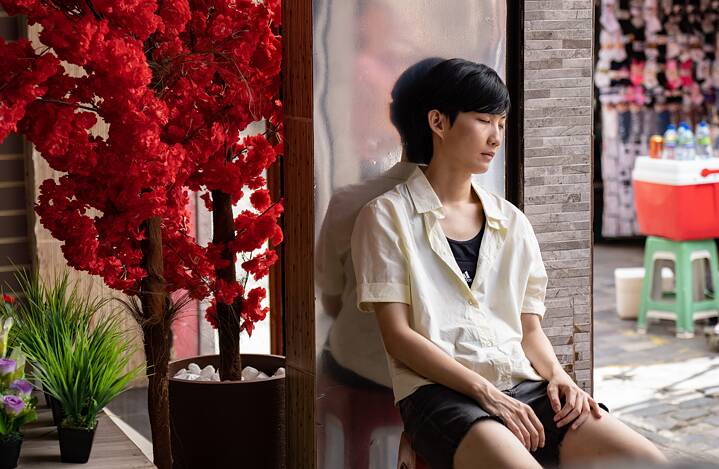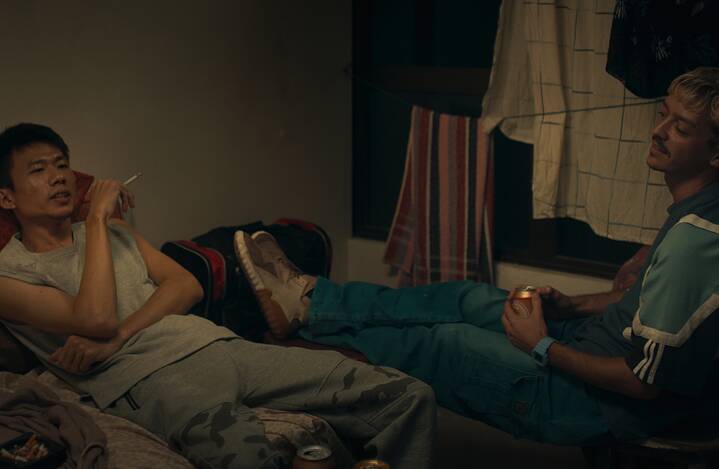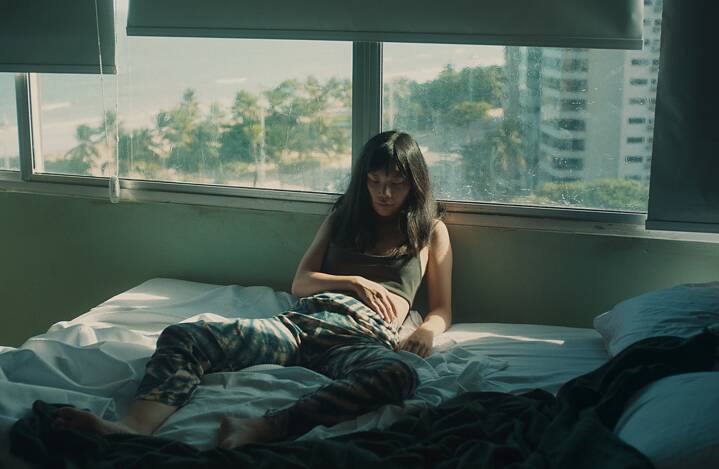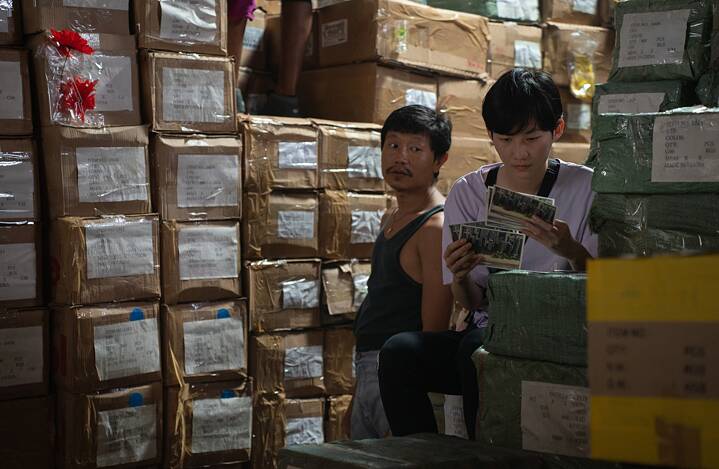Berlinale Bloggers 2024
Dreaming with eyes open
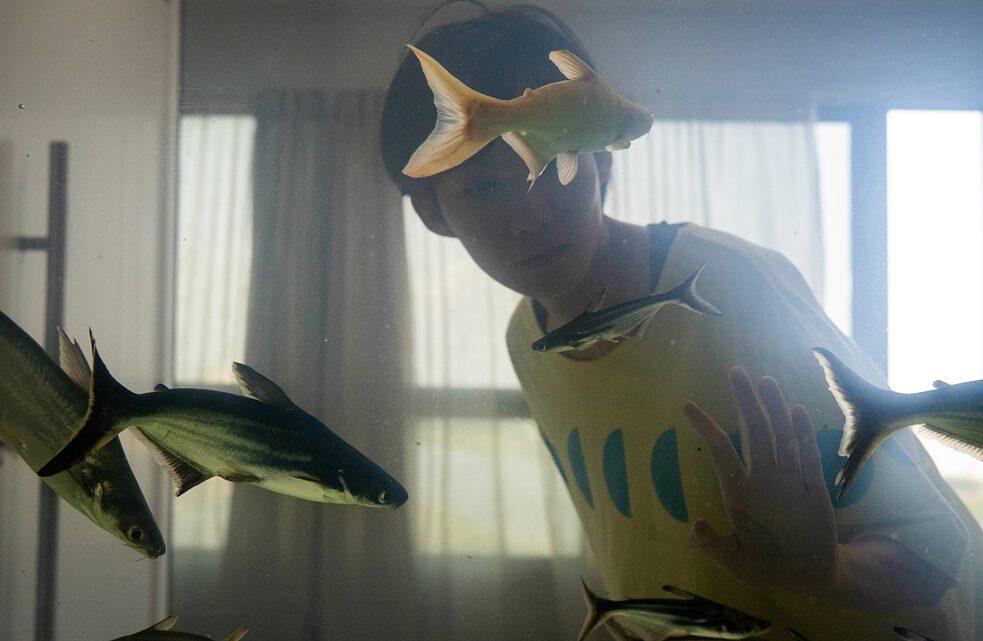
At the Berlin International Film Festival – A reflection on “Dormir de olhos abertos” (Sleep with your eyes open) by Nele Wohlatz.
Frightened by the disguised sailor who drunkenly taps on the aquarium glass and clumsily plunges his hand into the water, the fish swim restlessly in all directions. The faux-marin mumbles something about sushi and brings his hand to his mouth, laughs and turns to his colleague, another faux-marin, stuck in front of a Chinese painting. Already unable to stand up straight, he clings to the glass rim of the aquarium while Xiaoxin and Fu Ang try to hold him back. From the neighboring apartments, you can hear the bass of the party music at full volume.
Like little bubbles
The aquarium in Nele Wohlatz's Dormir de olhos abertos (Sleep with your eyes open), presented in the Encounters section of the 74th Berlin International Film Festival – the Berlinale – is a metaphor for uprootedness and the rather random community formed by its protagonists. The film by the German director, who has lived and worked in Argentina for over a decade, explores the question of how to find belonging in a foreign environment, with lightness and a great deal of tenderness. Her film explores the movements of individuals who are a little like bottles in the water, each moving in their own little bubbles, hydrodynamic and adaptable to new environments, new encounters, carried by the current, ready to try and make the best of wherever the waves release them.It's the story of Xaoxin, a Chinese woman who has come to Recife from Argentina, and lives with her aunt and uncle and a group of undocumented compatriots in a condo in a luxury building. Her aunt has become rich by importing products made in China. Workers come and go, but it's with Fu Ang that Xiaoxin makes friends. Curious about this parallel life, different yet similar to her own, Kai tries to retrace Xiaoxin's steps in this enormous city.
Nele Wohlatz, director of Futuro Perfecto (Future Perfect), which won Best First Feature at Locarno, having herself emigrated from Germany to Argentina, was certainly inspired by her own emotions in making this film, whose screenplay is also co-written by Pìo Longo, with whom she had already worked on her last film. Although Dormir de olhos abertos looks at two very different currents of mobility – tourism on the one hand and illegal immigration on the other - as well as the exploitation of labor, her gaze is not judgmental. On the contrary, she portrays her protagonists, their misfortunes, their small joys and their disappointments, with great sensitivity. The characters are all looking for something or someone. They go with the flow, sometimes good, sometimes bad. But, like the fish in Xiaoxin's aunt's aquarium, they form a community – uprooted, admittedly – but a community nonetheless.
In the aquarium
The aquarium is an artificial environment. It recreates a natural habitat for the creatures that inhabit it. Its glass walls are permeable to view and outside influences. An aquarium offers little protection against external disruptions - such as drunken false marines. The aquarium is – after all – only a substitute, a projection, a glass box, distinct from its environment and yet inseparable from it.I'd like to compare the Berlinale to the aquarium, to this artificial habitat: for 10 days in February, the festival welcomes cinephiles from all over the world. Just like me, all these people are in Berlin with their very individual motivations, goals and hopes. Together with all the professional and non-professional visitors, we form a random community. Although we don't know each other, we rub shoulders every day on our paths and in our cinemas. We all take the same subway, train or bus to Potsdamer Platz, the festival's central venue. Although the event is spread over a large number of cinemas and concert halls throughout the city's districts, it's at Potsdamer Platz that the swarm concentrates. It's here, in the Berlinale Palast, where the big premieres and galas are held. It's in the Hyatt Hotel across the street, where press conferences are held. And a few meters further on, at the European Film Market, where important decisions are made concerning film sales.
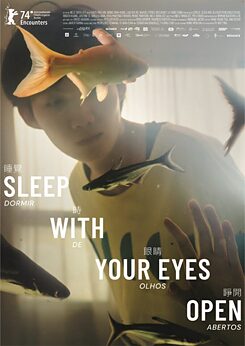 Poster for "Dormir de olhos abertos | Sleep with Your Eyes Open"
| © Cinema Scopio
The poster for Nele Wohlatz's film shows Xiaoxin looking at the fish in the aquarium. This image aptly reflects the paradox of co-presence in the same space and total detachment from these two spaces, which couldn't be more different in their aggregate state. Inside the festival, the current is strong, and it's possible to pass through the event without paying much attention to the outside world, the city, its political discourse or its struggles. You can fully immerse yourself in the flow of cinema entrances and exits, follow the swarm heading for the next takeaway café or vegan doughnut store. But even if we abandon ourselves to this whirlwind, as we rush from film to film or search for something to chock a tooth, it's only when the trains are interrupted again and we risk missing our first film due to state visits that we realize that we are indeed sharing this space with an outside world. It's in these moments that the city imposes itself. The disruption – the disruptive element, whether it's the hand of a faux-marin in an aquarium or the interruption of S-Bahn service – causes nervousness in the system, and we find ourselves running, with other strangers, from festival-goers to the next subway, hoping that this one won't be delayed either. It's these disruptions to the routine that, send us adrift and force us to sort and reposition ourselves. Where am I? By a pool in Recife or in Berlin?
Poster for "Dormir de olhos abertos | Sleep with Your Eyes Open"
| © Cinema Scopio
The poster for Nele Wohlatz's film shows Xiaoxin looking at the fish in the aquarium. This image aptly reflects the paradox of co-presence in the same space and total detachment from these two spaces, which couldn't be more different in their aggregate state. Inside the festival, the current is strong, and it's possible to pass through the event without paying much attention to the outside world, the city, its political discourse or its struggles. You can fully immerse yourself in the flow of cinema entrances and exits, follow the swarm heading for the next takeaway café or vegan doughnut store. But even if we abandon ourselves to this whirlwind, as we rush from film to film or search for something to chock a tooth, it's only when the trains are interrupted again and we risk missing our first film due to state visits that we realize that we are indeed sharing this space with an outside world. It's in these moments that the city imposes itself. The disruption – the disruptive element, whether it's the hand of a faux-marin in an aquarium or the interruption of S-Bahn service – causes nervousness in the system, and we find ourselves running, with other strangers, from festival-goers to the next subway, hoping that this one won't be delayed either. It's these disruptions to the routine that, send us adrift and force us to sort and reposition ourselves. Where am I? By a pool in Recife or in Berlin?
Dreaming with your eyes open
The controversies, the declarations, the pre-festival media spectacle, the outside view is quickly lost when you're inside the pool. The focus is on the films, each work for itself, with its questions, its answers, its points of view on the human condition in the face of the crises that reign in this world. And very quickly, during the first days of the festival, the films start to talk to each other. Avenues cross, as Xiaoxin's postcards – made in China – meet Kai's path, and little messages in one film answer a question posed in another. We begin to see the connections, and these take us back to the context in which the films are produced and/or presented. This cross-disciplinary dialogue thus forges a passageway, a link to the outside world, inspires reflection and leaves us changed and enriched.Ten days at the festival is a bit like dreaming with your eyes open – sharing a space-time with thousands of festival-goers and at the same time letting yourself be swept off into the world - from Potsdamer Platz to the beach in Recife. Although Nele Wohlatz's characters are lost, bewildered and sometimes disappointed, they are never discouraged. On the contrary, they are full of curiosity and openness to the world. As long as we all come together as individuals to form a community – random, but a community nonetheless – in the darkness of the cinema, and are prepared to be carried away, disturbed or even confronted by the cinema, there is hope.
